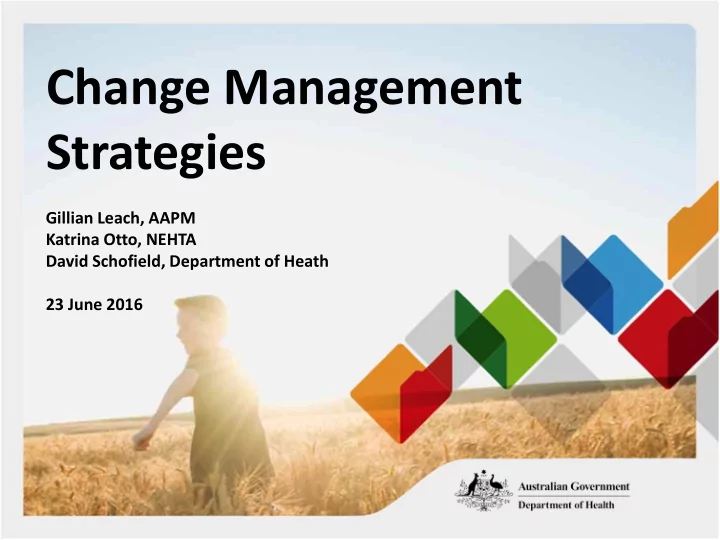

Change Management Strategies Gillian Leach, AAPM Katrina Otto, NEHTA David Schofield, Department of Heath 23 June 2016
Poll Question: Are you currently using the My Health Record system? Yes/No
Learning Objectives 1. Discuss change management strategies 2. Develop tools to lead change 3. Find the motivators that work for your team 4. Prepare your practice for the future 5. Implement quality improvement activities 6. Analyse lessons learnt from Great Southern Project & NT shared eHealth record system.
Poll Question: Who thinks that being told they have to do something a different way is the best thing that could ever happen to them?
1. Change Management Strategies
People experience change
What change management achieves Pre-change Change performance introduced exceeded Performance Time
Managing Transformational Change • Create a sense of urgency • Form a powerful guiding coalition • Create a vision • Communicate the vision • Empower others to act on the vision • Plan for and create short-term wins • Consolidate improvements and produce still more change • Institutionalise new approaches Devised by Professor John Kotter - http://www.kotterinternational.com/the-8-step-process-for-leading-change/ 8
2. Leading Change
Poll Question: Have the doctors or admin staff in your practice ever done anything that did not make sense to you?
Understanding the challenge
The view from the top
3. Find benefits/motivators that work for your team ? Financial ? Time ? Risk minimisation ? Patient demand
Poll Question: What have you found to be motivators that work for your staff?
Digital Health Incentive Payment 1. Integrating Healthcare Identifiers 2. Data Records and Clinical Coding 3. ePrescribing ePIP 4. Secure Messaging 5. Upload Shared Health Summaries to My Health Record for 0.5% of SWPE New: - Upload requirement per quarter starting 1 May 2016
4. Prepare your practice for the future • Progressive practices cannot ignore the digital health revolution. • Increasingly competitive world for practices, we have to keep up! • Promote your practice as modern and keeping up with digital health and the most progressive health tools. • Focus on the success stories & link to next change eg: Medicare Online, eftpos terminals, online banking, electronic pathology results, online appointments.
Manage Change with positivity Remind everyone of those change success stories
It is a new era!
Patient view of their My Health Record
Prepare for success • Training is important! • Upskill yourself so you feel confident. • Think of training as a process not an event. • Provide a variety of training opportunities for all staff. • Encourage a super-user on your admin team. • Find a champion doctor in your practice. • Have the answers ready – you know they’ll ask! • Source reliable information for your answers – we don’t know what we don’t know!
Training Environment On Demand Training Environment : Log on anytime and practise with a ‘test’ patient. Available at http://www.nehta.gov.au/using-the-my-health-record-system
Poll Question: What are your main barriers to increased use of the My Health Record system?
5. Implement quality improvement activities What are your barriers? What are your strategies?
Data Quality checklist
5. Implement quality improvement activities Quality Improvement project (for accreditation) on data quality. Practice Management monthly reporting on stats. Promote a culture of healthy competition with data quality Promote a progressive culture with digital health usage.
6. Lessons Learnt
6. Lessons Learnt from NT Experience 1. Gradual evolution towards critical mass 2. Becoming embedded into routine clinical and administrative workflow NEHTA, “MyEHR to National eHealth Record Transition Impact Evaluation,” National E -health Transition Authority Ltd, 10 Jul 2015. [Online]. Available: http://www.nehta.gov.au/get-started-with-ehealth/ehealth-benefits/case-studies/northern-territory/918- myehr-to-national-ehealth-record-transition-impact-evaluation
Evaluation of NT Feedback from clinicians: It took 5 and half years of continual and sustained change effort in NT before tipping point occurred. Now providers rely on a shared record service as a mechanism to overcome the fragmentation of health information. "I've been obsessive with MeHR since it first came in because of everything I can see. It saves you so much trouble, so much time." GP "Without the MeHR you couldn't have made the same decision" Registered Nurse & Midwife
Evaluation of NT eHealth showed strong evidence of benefits attributable “ The amount of information as it built up, built the clinicians' confidence in using it .” Department Director
6. Lessons Learnt – Great Southern Dual adoption approach – connected community complimented by national coordination
6. Lessons Learnt – Great Southern Connecting a Community Relationships with Practice Managers. Team meeting in each practice to discuss appropriate workflow.| Encourage a super-user on the nursing and admin teams. Find a champion GP in the practice. Network & share success stories – what’s worked at other practices? Practice Nurse & Practice Managers Community group meetings. Community awareness/events.
6. Lessons Learnt – Great Southern Training is Important! Provide training for all staff, not just doctors. Mixture of face-to-face and online training & support. Prepare dialogue for reception staff & role-play until confident Encourage use of ‘On - Demand’ Training Environment. Embed assisted registration into practice processes. Have a variety of information resources available. Embed into process eg change templates and forms, prompt
6. Lessons Learnt A positive Practice Manager can make all the difference!
Questions?
Where to get help? • Call the NEHTA Help Centre on 1300 901 001 or email help@nehta.gov.au • Visit www.myhealthrecord.gov.au for information on the My Health Record system and promotional resources • View the Software Demonstrations on the NEHTA website http://www.nehta.gov.au/for-providers/ehealth-support- tools/software-demonstrations
Recommend
More recommend